It feels like this happened last week though it actually happened twenty years ago. Late one wintry afternoon in 1992 I found myself sitting on a sofa in a glass box in midtown Manhattan, trying to figure out how I could possibly stay awake till sundown. I had just enjoyed a long celebratory liquid lunch with Gary Fisketjon, who would soon be publishing my first novel and who, as I’d learned first-hand, is a master of an art that was then dying and is now all but dead – the art of editing fiction, line by agonizing line. Gary had gone over every word of my 362-page manuscript with a green Bic ballpoint pen, sometimes suggesting surgical cuts or ways to improve dialog, sometimes writing long insightful paragraphs on the back of a page. He stressed that these were merely suggestions, that the final call was mine, always. If I had to guess, I would say he improved my book at least by half. As I sat there on the sofa in Gary’s office, my fogged eyes started roaming across his bookshelves…
(As I re-read the preceding paragraph, I realize it’s about ancient history, a long-lost time when book editors actually edited books and they were encouraged to keep their authors fed and watered on the company dime. That paragraph also reminds me of something John Cheever wrote in the 1970s – that his first stories, published in the years after World War II, were “stories of a long-lost world when the city of New York was still filled with a river light, when you heard Benny Goodman quartets from a radio in the corner stationery store, and when almost everybody wore a hat.” Gary Fisketjon’s industrious green Bic pen seems even more remote to me from a distance of twenty years than those 1940s radios and stationery stores seemed to John Cheever from a distance of thirty years.)
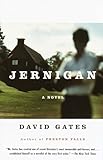 …so anyway, my fogged eyes landed on a slim volume with one word on its spine: Jernigan. I got up off the sofa, crossed the small office and picked up the book. On the dust jacket the blurry figure of a man stands on a lawn in front of a suburban house. At first I thought it was the liquid lunch affecting my vision, but then I realized the picture was intentionally fuzzy. “What’s this?” I asked.
…so anyway, my fogged eyes landed on a slim volume with one word on its spine: Jernigan. I got up off the sofa, crossed the small office and picked up the book. On the dust jacket the blurry figure of a man stands on a lawn in front of a suburban house. At first I thought it was the liquid lunch affecting my vision, but then I realized the picture was intentionally fuzzy. “What’s this?” I asked.
“That’s a first novel I brought out last year by a wonderful writer named David Gates,” Gary said. “Sonny Mehta, my boss, loves one-word titles. Go ahead, take it.”
I took it. I read it. I loved it. It’s the story of a messed-up guy from the New Jersey suburbs named Peter Jernigan who works a boring job in Manhattan real estate and is dealing with his wife’s death in an automobile accident by dosing himself with gin and Pamprin as his life falls apart. He ends up sleeping with the single mom of his teenage son’s girlfriend. The woman is a survivalist who keeps rabbits in her basement (for meat, not as pets). One day, in an effort to snap out of his spiritual numbness, Jernigan presses the barrel of a gun to the webbing between the thumb and index finger of his left hand, then squeezes the trigger. I’ll carry that image in my head as long as I live.
Ever since I fell in love with Jernigan I’ve been drawn to books with one-word titles – partly because Sonny Mehta loves one-word titles, but mainly because they can be so enviably concise and memorable, so perfect. At their best, one-word titles distill content to its purest essence, which is what all titles strive to do, and then they stick in the mind. Sometimes, of course, they fall flat, and much of the time they’re just lukewarm and vague or, worse, falsely grand.
Over the years I’ve developed categories and a pecking order. Here is my unscientific and by no means exhaustive taxonomy, beginning with the best and ending with the worst kinds of one-word book titles:
1. An Unforgettable Character’s Name
 This category begins for me with Jernigan but also includes:
This category begins for me with Jernigan but also includes:
Shakespeare’s Othello, Macbeth, and Hamlet (for the last title in this trio of masterpieces I wish he’d gone with Yorick, that “fellow of infinite jest,” which no doubt puts me in a minority of one).
Walker Percy’s Lancelot (the wife-murdering narrator in a nuthouse, Lancelot Andrewes Lamar says many wise and funny things about the decline of America, such as: “What nuns don’t realize is that they look better in nun clothes than in J.C. Penney pantsuits.”)
Vladimir Nabokov’s Lolita (the nymphet who became an icon).
Bram Stoker’s Dracula and Mary Shelley’s Frankenstein (two icons who became franchises).
Cormac McCarthy’s Suttree (not my favorite of his novels – that would be Blood Meridian – but the things Cornelius Suttree and his roughneck Tennessee riverfront buddies do while under the influence of alcohol give a whole new kick to the word “debauched”).
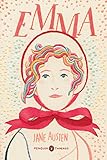 Jane Austen’s Emma (I might think Emma Woodhouse is a meddling, coddled ninny, but I wouldn’t dream of saying so).
Jane Austen’s Emma (I might think Emma Woodhouse is a meddling, coddled ninny, but I wouldn’t dream of saying so).
Stephen King’s Carrie (you’ve got to respect a girl who gets drenched in pig’s blood at the prom and then goes on a telekinetic rampage), Christine (what’s not to love about a homicidal Plymouth Fury?), and It (that maniac clown Pennywise deserves such a tersely dismissive moniker).
2. Place Names That Drip With Atmosphere
Elmore Leonard’s Djibouti (just saying the word makes it possible to conjure a place full of pirates, thugs, widowmakers, scorching sunshine, and tourists with a death wish; Leonard is a serial user of one-word titles, including the less memorable Raylan, Pronto, Killshot, Touch, Bandits, Glitz, Stick, Gunsights, Swag, and Hombre).
Gore Vidal’s Duluth (alluring precisely because it’s so imprecise – what could possibly be interesting about a Minnesota port town on Lake Superior? Plenty. Vidal is another serial user of one-word titles, including Williwaw, Messiah, Kalki, Creation, Burr, Lincoln, Hollywood, and Empire).
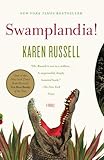 Karen Russell’s Swamplandia! (that exclamation point befits the over-the-top setting, a fading alligator theme park in the moist loins of Florida).
Karen Russell’s Swamplandia! (that exclamation point befits the over-the-top setting, a fading alligator theme park in the moist loins of Florida).
Marilynne Robinson’s Gilead (your first thought is Biblical – balm of Gilead or Mount Gilead – but the title of this Pulitzer Prize-winning novel is the name of a town in Iowa where the God-infused protagonist, a dying preacher, is writing a long letter to his young son; Robinson’s other novels are titled Housekeeping and Home).
Geoffrey Wolff’s Providence (this title, like all good titles, has layers of meaning: the novel is set in the crumbling capital of Rhode Island – “a jerkwater that outsiders bombed past on their way to Cape Cod” – but this Providence is visited by surprising gusts of divine providence, God’s inscrutable ways of touching a menagerie of less-than-perfect characters, including mobsters, thieves, patrician lawyers, cokeheads, and crooked cops).
Thomas Pynchon’s Vineland (alas, the title refers to a fictional hippie outpost in northern California, not to that sweaty little armpit in the New Jersey pine barrens – now that would have been a ripe setting for a Pynchon novel).
Marshall Frady’s Southerners (fluorescent non-fiction about the people who inhabit a haunted place, it’s one of my all-time favorite books).
Then, on the downside, there’s James Michener’s Hawaii (a title that’s about as evocative as a pushpin on a map, much like his other generic place-name titles – Chesapeake, Alaska, Poland, Texas, Mexico, and Space).
3. One Little Word That Sums Up Big Consequences
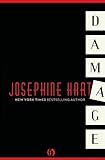 Josephine Hart’s Damage (edited by Sonny Mehta, the novel’s title deftly sums up what results when a member of the British Parliament develops an obsessive sexual relationship with his son’s fiancee; Jeremy Irons, at his absolute smarmy best, plays the MP in the movie version of the book. Hart, who died last year, also published the novels Sin and Oblivion).
Josephine Hart’s Damage (edited by Sonny Mehta, the novel’s title deftly sums up what results when a member of the British Parliament develops an obsessive sexual relationship with his son’s fiancee; Jeremy Irons, at his absolute smarmy best, plays the MP in the movie version of the book. Hart, who died last year, also published the novels Sin and Oblivion).
James Dickey’s Deliverance (refers to what it feels like to return home to the Atlanta suburbs after surviving a nice relaxing canoe trip in the Georgia woods that turns into a nightmare of hillbilly sodomy and murder).
 Martin Amis’ novel Money (a raunchy hymn to the lubricant that greased the Reagan/Thatcher decade, it’s bursting with the things that made America great – “fast food, sex shows, space games, slot machines, video nasties, nude mags, drink, pubs, fighting, television, handjobs”); and his memoir Experience (with a cover that says it all: the future bad boy of Brit letters as a pre-teen towhead, with a scowl on his face and an unlit cigarette plugged between his lips).
Martin Amis’ novel Money (a raunchy hymn to the lubricant that greased the Reagan/Thatcher decade, it’s bursting with the things that made America great – “fast food, sex shows, space games, slot machines, video nasties, nude mags, drink, pubs, fighting, television, handjobs”); and his memoir Experience (with a cover that says it all: the future bad boy of Brit letters as a pre-teen towhead, with a scowl on his face and an unlit cigarette plugged between his lips).
William S. Burroughs’ Junky (though written under a pseudonym, the title of this highly autobiographical 1953 novel refers to what you will become if you inject heroin into your veins on a regular basis; a sequel, Queer, was written earlier but not published until 1985).
Harry Crews’ Car (you are what you eat, and Herman Mack, in a twist that out-Christines Christine, sets out to eat a 1971 Ford Maverick from bumper to bumper; rest in peace, Harry Crews).
4. Words That Ache So Hard To Become Brands You Can Practically See Them Sweat
 The absolute pinnacle of this bottom-of-the-birdcage category is half-smart Malcolm Gladwell’s runaway bestseller Blink (as in, how long it takes for us to develop supposedly accurate first impressions; for a much more nuanced and intelligent treatment of this fascinating subject, check out Daniel Kahneman’s Thinking, Fast and Slow).
The absolute pinnacle of this bottom-of-the-birdcage category is half-smart Malcolm Gladwell’s runaway bestseller Blink (as in, how long it takes for us to develop supposedly accurate first impressions; for a much more nuanced and intelligent treatment of this fascinating subject, check out Daniel Kahneman’s Thinking, Fast and Slow).
Not far behind is right-wing goddess Ann Coulter’s Godless (an attempt to prove that liberalism is America’s state religion and its tin gods are recycling, Darwinism, global warming, gay rights, abortion rights, and teachers’ unions. According to this harridan-hottie, “The following sentence makes sense to liberals: President Clinton saved the Constitution by repeatedly ejaculating on a fat Jewish girl in the Oval Office.” Low blow! Monica Lewinsky wasn’t fat!)
Robin Cook’s Contagion (possibly a Freudian slip, the title might refer to what all brand-name authors like Cook secretly hope their books will induce in readers: a rapidly spreading, uncontrollable itch to spend money on schlock).
Mark Kurlansky’s Cod and Salt (books that claim, breathlessly and falsely, to be about simple things that single-handedly changed the history of the universe).
5. One-Letter Titles
You can’t get any poorer than dead, as Flannery O’Connor reminded us, and if you’re a book title you can’t be any more concise than a single letter. Writers who have boiled the contents of their books down to a single letter tend to be in the high-literary camp, which would seem to suggest, counter-intuitively, that one-letter titles are the work of expansive, not reductive, imaginations. Here are a few, from A to Z:
Andy Warhol’s A (you’d have to be zonked on some killer shit to make any sense of this gibberish, but let’s be charitable and remember that Warhol was a great artist).
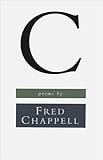 Fred Chappell’s C (this writer of glorious poetry and fiction is celebrated in his native South but criminally under-appreciated in other quarters of the country; his title is taken from the Roman numeral for 100, which is the number of poems in this superb collection).
Fred Chappell’s C (this writer of glorious poetry and fiction is celebrated in his native South but criminally under-appreciated in other quarters of the country; his title is taken from the Roman numeral for 100, which is the number of poems in this superb collection).
Tom McCarthy’s C (the third letter of the alphabet is used more nebulously in this novel, which brims with cats, cocaine, cocoons, and code as it travels to Cairo with a protagonist named Serge Carrefax; McCarthy’s first novel was titled Remainder).
John Updike’s S. (it’s the initial of the novel’s protagonist, Sarah Worth, part superwoman and part slut, a disaffected wife who leaves her husband and her home on the North Shore to pursue her guru at a commune in the Arizona desert).
Thomas Pynchon’s V. (no, Pynchon’s first novel is not Vineland minus the i-n-e-l-a-n-d; it’s a woman’s initial, or is it the shape the two storylines make as they converge?).
Georges Perec’s W (the name of an allegorical island off the coast of Chile that resembles a concentration camp).
Vassilis Vassilikos’ Z (the last word, or letter, on political thrillers, it’s about the 1963 assassination of leftist Greek politician Grigoris Lambrakis; Costa-Gavras made it into a hit movie starring Yves Montand).
In closing, I should note that seven of the 32 books on the current New York Times hardcover fiction and non-fiction best-seller lists – a healthy 22 percent – have one word titles: to wit: Betrayal, Drift, Imagine, Wild, Unbroken, Quiet, and Imperfect. Turns out Sonny Mehta was on to something. Concision, like sex, always sells.









